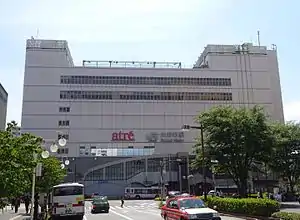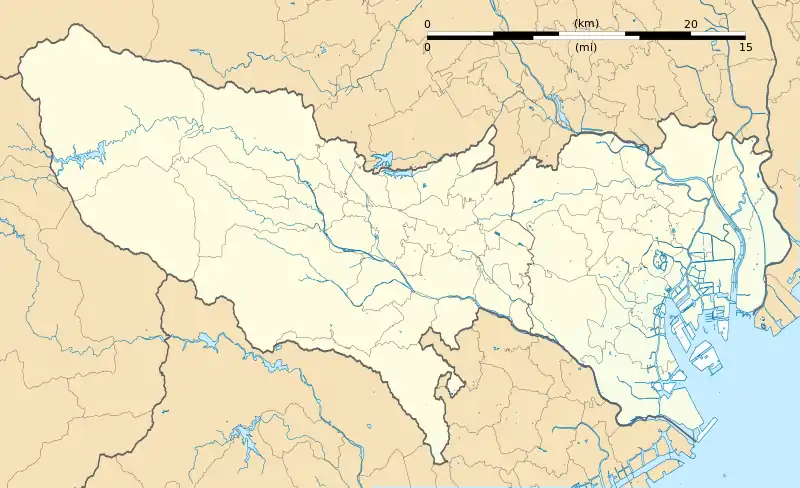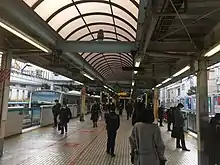Ōimachi Station
Ōimachi Station (大井町駅, Ōimachi-eki) is an interchange railway station in Shinagawa, Tokyo, Japan, operated by East Japan Railway Company (JR East), Tokyo Waterfront Area Rapid Transit (TWR), and the private railway operator Tokyu Corporation.
JK19 OM01 R07 Ōimachi Station 大井町駅 | |
|---|---|
 Ōimachi station Central Exit | |
| Location | Shinagawa, Tokyo Japan |
| Operated by | JR East, TWR, Tokyu |
| Line(s) |
|
| History | |
| Opened | 1914 |
| Location | |
 Ōimachi Station Location within Tokyo  Ōimachi Station Ōimachi Station (Japan) | |
Lines
Ōimachi Station is served by the following lines:
- JR East Keihin-Tohoku Line
- TWR Rinkai Line
- Tokyu Oimachi Line
Station layout


JR platforms
| 1 | JK Keihin-Tohoku Line | for Tokyo, Ueno, Akabane and Ōmiya |
| 2 | JK Keihin-Tohoku Line | for Kawasaki, Yokohama, and Negishi Line for Ōfuna |
Tokyu platforms
| 1,2 | OM Tokyu Oimachi Line | for Ōokayama, Jiyūgaoka, Futako-tamagawa, and Mizonokuchi |
The Tokyu Oimachi Line platforms are scheduled to be lengthened to handle seven-car trains on express services during fiscal 2017.[1]
TWR platforms
| 1 | R JA Rinkai Line・Saikyo Line | for Ōsaki, Shinjuku, Akabane and Ōmiya |
| 2 | R Rinkai Line | for Tokyo Teleport and Shin-Kiba |
Chest-height platform edge doors are scheduled to be installed on the TWR platform during fiscal 2019.[2]
Adjacent stations
| « | Service | » | ||
|---|---|---|---|---|
| Keihin-Tōhoku Line JK19 | ||||
| Ōmori JK18 | Rapid | Shinagawa SGWJK20 | ||
| Ōmori JK18 | Local | Shinagawa SGWJK20 | ||
| Tokyu Oimachi Line OM01 | ||||
| Terminus | Express | Hatanodai OM06 | ||
| Terminus | Local (calling at Futako-Shinchi and Takatsu) |
Shimo-Shimmei OM02 | ||
| Terminus | Local (passing Futako-Shinchi and Takatsu) |
Shimo-Shimmei OM02 | ||
| Rinkai Line R07 | ||||
| Shinagawa Seaside R06 | - | Ōsaki R08 | ||
Passenger statistics
In fiscal 2013, the JR East station was used by an average of 100,403 passengers daily (boarding passengers only), making it the 38th-busiest station operated by JR East.[3] Over the same fiscal year, the TWR station was used by an average of 38,133 people daily (boarding passengers only).[4] In fiscal 2013, the Tokyu station was used by an average of 137,025 people daily (entering and exiting passengers), making it the busiest station on the Oimachi Line.[5] The average daily passenger figures for previous years are as shown below.
| Fiscal year | JR East | TWR | Tokyu |
|---|---|---|---|
| 2000 | 78,996[6] | ||
| 2005 | 86,298[7] | 106,157[8] | |
| 2010 | 94,715[9] | 126,395[10] | |
| 2011 | 95,225[11] | 33,124[4] | 127,424[12] |
| 2012 | 97,865[13] | 36,554[4] | 132,564[14] |
| 2013 | 100,403[3] | 38,133[4] | 137,025[5] |
| 2014 | 39,749[2] |
- Note that the JR East and TWR statistics are for boarding passengers only.
Surrounding area
- Yamada Denki-Shinagawa Kyurian Hall
- JR Tokyo General Rolling Stock Center
- The Shiki Theatre Natsu
- Atré Shopping Centre
- Hankyu Oimachi Garden
- Shinagawa Ward Office
- Shinagawa Post Office
- Brillia Oi-machi La Vie En Towner
- Ebara Shichi-Fuku-Jin (Seven Lucky Gods in Ebara area)
- Oi zao gongen jinja shrine
- Sendai miso Brewery
- Zēmusu-saka
- Old Sendai slope (Slope of darkness)
 Yamada Denki-Shinagawa Kyurian Hall
Yamada Denki-Shinagawa Kyurian Hall JR Tokyo General Rolling Stock Center
JR Tokyo General Rolling Stock Center The Shiki Theatre Natsu
The Shiki Theatre Natsu Atré Shopping Centre
Atré Shopping Centre Hankyu Oimachi Garden
Hankyu Oimachi Garden Ōi zao Gongen-jinja Shrine
Ōi zao Gongen-jinja Shrine
See also
References
- 田園都市線および大井町線の朝ラッシュ時の混雑緩和施策を実施 [Measures implemented to alleviate morning rush-hour overcrowding on Denentoshi and Oimachi Lines] (PDF). News release (in Japanese). Japan: Tokyu Corporation. 22 March 2017. p. 2. Archived (PDF) from the original on 23 March 2017. Retrieved 23 March 2017.
- りんかい線ホームドア導入 国際展示場駅は2018年度中 [Platform doors to be introduced on Rinkai Line - Kokusai-Tenjijō Station in fiscal 2018]. Traffic News (in Japanese). Japan: MediaVague Co., Ltd. 29 September 2015. Retrieved 29 September 2015.
- 各駅の乗車人員 (2013年度) [Station passenger figures (Fiscal 2013)] (in Japanese). Japan: East Japan Railway Company. Retrieved 14 September 2014.
- りんかい線について [Rinkai Line FAQ] (in Japanese). Japan: Tokyo Waterfront Area Rapid Transit Inc. Retrieved 14 September 2014.
- 2013年度乗降人員 [2013 Station passenger figures] (in Japanese). Japan: Tokyū Corporation. 14 September 2014. Retrieved 14 September 2014.
- 各駅の乗車人員 (2000年度) [Station passenger figures (Fiscal 2000)] (in Japanese). Japan: East Japan Railway Company. Retrieved 14 September 2014.
- 各駅の乗車人員 (2005年度) [Station passenger figures (Fiscal 2005)] (in Japanese). Japan: East Japan Railway Company. Retrieved 14 September 2014.
- 2005年度乗降人員 [2005 Station passenger figures] (in Japanese). Japan: Tokyū Corporation. 19 May 2006. Retrieved 14 September 2014.
- 各駅の乗車人員 (2010年度) [Station passenger figures (Fiscal 2010)] (in Japanese). Japan: East Japan Railway Company. Retrieved 14 September 2014.
- 2010年度乗降人員 [2010 Station passenger figures] (in Japanese). Japan: Tokyū Corporation. 19 May 2011. Retrieved 14 September 2014.
- 各駅の乗車人員 (2011年度) [Station passenger figures (Fiscal 2011)] (in Japanese). Japan: East Japan Railway Company. Retrieved 14 September 2014.
- 2011年度乗降人員 [2011 Station passenger figures] (in Japanese). Japan: Tokyū Corporation. 15 May 2012. Retrieved 14 September 2014.
- 各駅の乗車人員 (2012年度) [Station passenger figures (Fiscal 2012)] (in Japanese). Japan: East Japan Railway Company. Retrieved 14 September 2014.
- 2012年度乗降人員 [2012 Station passenger figures] (in Japanese). Japan: Tokyū Corporation. 29 May 2013. Retrieved 14 September 2014.
External links
| Wikivoyage has a travel guide for Oimachi. |
- Ōimachi Station information (JR East) (in Japanese)
- Ōimachi Station information (TWR) (in Japanese)
- Ōimachi Station information (Tokyu) (in Japanese)